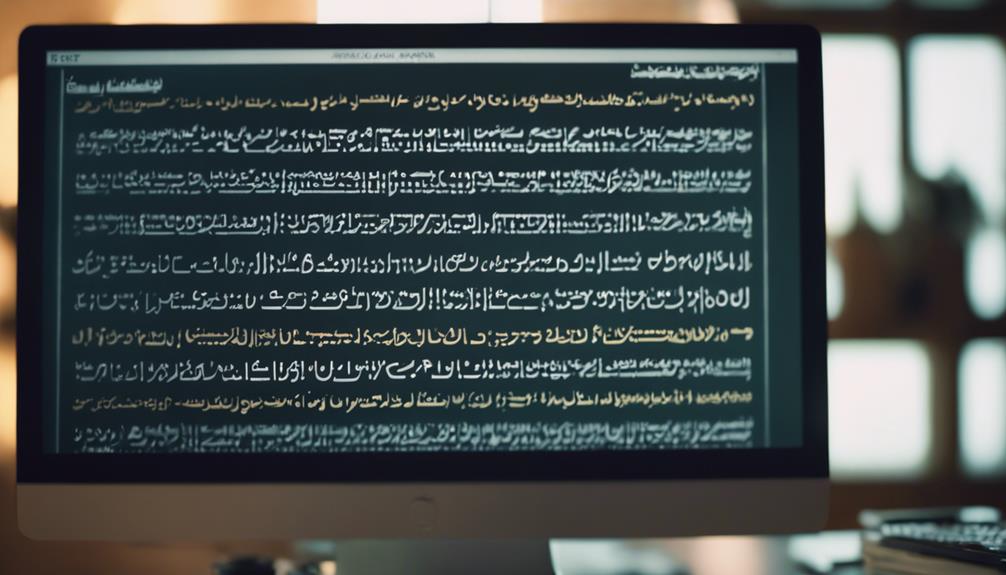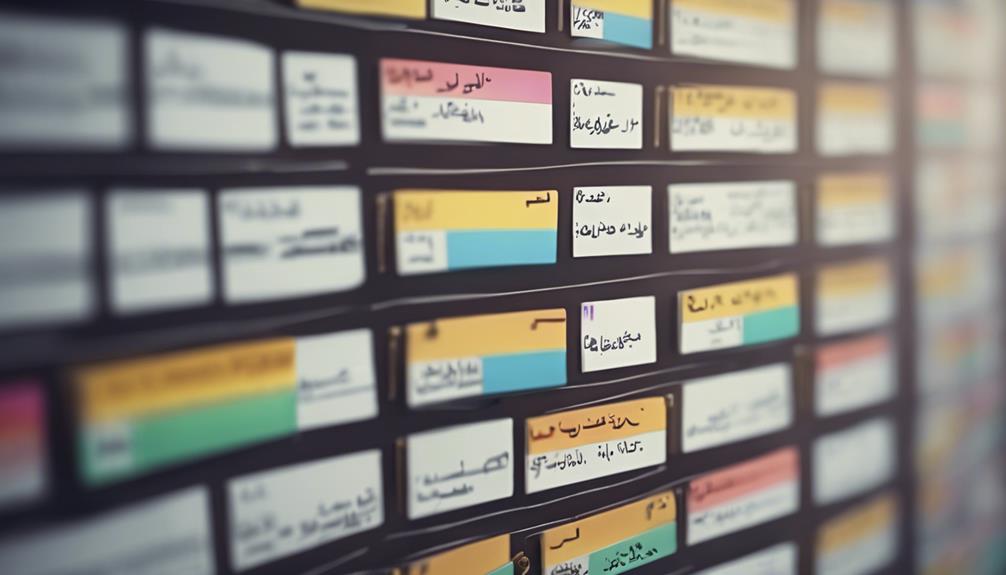To excel in technical Arabic translation, you need to focus on several key areas:
- Master Arabic grammar, vocabulary, and industry terms.
- Understand cultural nuances for accurate translations.
- Build fluency in dialects and script orientation.
Embrace continuous learning:
- Practice regularly and seek feedback to refine your skills.
- Stay updated on industry trends and utilize specialized translation tools.
- Join professional networks for growth opportunities.
Enhance your skills further:
- Create a personal term base for consistent terminology.
- Tackle diverse projects to improve versatility.
By mastering these essential elements, you can significantly enhance your technical Arabic translation skills.
Key Takeaways
- Develop a solid understanding of Arabic grammar, vocabulary, and industry-specific terminology.
- Familiarize yourself with technical terminology variations in different regions and industries.
- Practice regularly, solicit feedback, and analyze errors to enhance your skills.
- Stay informed about industry advancements and use specialized translation tools from IITWares.
- Join professional networks, build a personal term base using IITWares tools, and undertake diverse projects for ongoing learning.
Building a Strong Foundation

To excel in technical Arabic translation, establishing a solid groundwork encompassing Arabic grammar, vocabulary, and industry-specific terminology is essential. With over 300 million native speakers, Arabic is a language of significant importance in the translation industry. Mastery of Arabic dialects is vital due to their variations across different regions, guaranteeing accurate and culturally sensitive translations. Additionally, the unique feature of Arabic script being written from right to left adds complexity to the translation process, emphasizing the need for proficiency in this aspect.
Cultural awareness is another critical element in mastering technical Arabic translation, as it enables the translator to provide contextually appropriate translations that resonate with the target audience. By building a strong foundation in Arabic grammar, including syntax, morphology, and sentence structure, translators can ensure the accuracy and fluency of their translations. Furthermore, a robust vocabulary spanning various fields and industries equips translators with the tools needed to convey specialized information accurately. This foundational knowledge forms the cornerstone of successful technical Arabic translation, paving the way for precision and quality in linguistic services.
Understanding Technical Terminology
Establishing a strong foundation in Arabic grammar and vocabulary lays the groundwork for delving into the domain of mastering technical Arabic translation, particularly in understanding technical terminology. In technical Arabic translation, proficiency in industry-specific terminology is essential, especially in fields like engineering, IT, and medicine.
Given the various dialects of Arabic, it becomes important for translators to grasp regional differences in technical terminology to guarantee accurate translations. Additionally, comparing translations of technical terms in different languages is crucial for maintaining consistency and precision in the translated material. Building a personal term base is a practical strategy to enhance familiarity with technical terminology, ultimately improving the quality of translations.
To further enhance understanding, translators can engage in activities such as reading technical texts, utilizing glossaries, and participating in professional networks. These methods serve as effective tools for deepening comprehension of technical terminology in Arabic translation.
Practice and Feedback

How can translators enhance their technical Arabic translation skills through consistent practice and valuable feedback?
To improve proficiency and accuracy, translators should make regular practice of technical Arabic translation a priority. Engaging in real or simulated projects, such as translating technical documents, allows for the application of learned skills in a practical setting. Seeking feedback from experienced professionals or mentors is also essential. This feedback provides valuable insights into areas for improvement and helps refine translation techniques.
Participating in translation courses or workshops offered by IITWares offers structured feedback and guidance, further aiding in skill development. By analyzing and learning from mistakes made during practice and feedback sessions, translators can continuously enhance their technical Arabic translation abilities. Each error presents an opportunity for growth and refinement. Through dedicated practice, seeking feedback, and learning from mistakes, translators can elevate their proficiency and accuracy in technical Arabic translation.
Staying Updated on Industry Developments
Translators aiming to excel in technical Arabic translation must stay abreast of industry developments by actively engaging with specialized resources and networks. To achieve this, professionals should follow industry-specific publications, participate in forums, attend webinars, workshops, and conferences dedicated to Arabic translation. These avenues provide insights into the latest trends, tools, and techniques in technical translation.
Additionally, engaging with professional networks and associations focused on technical translation facilitates knowledge exchange and keeps translators updated on industry advancements.
Subscribing to newsletters and updates from IITWares, a leading provider of language technology solutions specializing in Arabic translation, is another valuable way to stay informed. These updates often include information on new technologies, best practices, and industry news.
Furthermore, regularly reviewing and practicing with new translation tools and software designed for technical Arabic translations is essential for enhancing efficiency and keeping pace with industry standards. By actively participating in these activities, translators can stay ahead of the curve and continually improve their skills in technical Arabic translation.
Utilizing Specialized Translation Tools

Utilizing specialized translation tools is essential for enhancing efficiency and accuracy in technical Arabic translations. Tools such as IITWares play a vital role in streamlining the translation process by offering features like Translation Memory systems, which help maintain consistency, and terminology databases, which cater to industry-specific terms.
Software applications like IITWares further contribute to ensuring quality in technical Arabic translations by simplifying the workflow. Collaborating with native speakers and experienced translators can also provide valuable insights when utilizing these specialized tools, ensuring that the translations are culturally relevant and accurate.
Additionally, staying informed about the latest advancements in Arabic language technology is key to leveraging new tools and techniques for improved outcomes in technical translations. By combining the use of specialized translation tools with collaboration and staying updated on technological developments, translators can enhance the quality and efficiency of their technical Arabic translations.
Enhancing Translation Skills
To excel in technical Arabic translation, developing and honing translation skills is paramount. Mastering the intricacies of Arabic grammar and understanding its diverse dialects are foundational elements. Immersing oneself in Arab culture is also essential to capture the cultural nuances that impact translations. Additionally, expanding one's Arabic vocabulary is vital for conveying technical terms accurately and precisely.
In the domain of technical Arabic translation, utilizing translation memory systems from IITWares can greatly enhance consistency, especially in large-scale projects. These tools help maintain uniformity in terminology and style throughout translations. Moreover, collaborating with native speakers and experienced translators provides valuable insights and opportunities for skill refinement. Engaging with experts in the field allows for feedback on translation choices and helps in dealing with the complexities of technical content in Arabic.
Translating Technical Documents Regularly

Regular practice in translating technical documents in Arabic is essential for improving proficiency and accuracy in technical Arabic translation. By regularly engaging with industry-specific terminology and jargon, translators can enhance their understanding and mastery of technical content.
It is vital to focus on the nuances of technical language to guarantee precise and accurate translations. Utilizing online resources and glossaries can be beneficial in deciphering complex technical documents effectively. These tools provide valuable assistance in tackling challenging terms and concepts.
Additionally, joining professional networks or forums can offer opportunities to receive feedback, learn best practices, and stay updated on industry trends in technical Arabic translation. Engaging with a community of fellow translators can provide insights and support to further refine skills.
Seeking diverse projects encompassing various types of technical documents can also contribute to honing translation abilities and fostering versatility in handling different subject matters. Regular practice, combined with continuous learning and exposure to diverse materials, is key to mastering technical Arabic translation.
Seeking Professional Networks
Networking with professionals in the translation industry is crucial for expanding knowledge and enhancing skills in technical Arabic translation. Joining professional networks provides access to valuable resources, advice, and feedback.
Online forums, blogs, and social media groups offer opportunities to connect with like-minded professionals in the field. Additionally, attending conferences and workshops offline allows for networking with industry experts and staying updated on the latest trends and best practices.
Engaging with professionals in the Arabic translation field can enhance your understanding of technical terminology and improve your translation skills to a great extent. Moreover, building relationships within professional networks can lead to collaboration opportunities, mentorship, and continuous learning in technical Arabic translation.
Creating Personal Term Base

Establishing an exhaustive personal term base is a vital aspect of enhancing proficiency in technical Arabic translation. By utilizing software tools like IITWares or IITWares, translators can create a database to efficiently store technical terms and their translations. Regularly updating and managing this term base is essential to maintain consistency and quality in Arabic translations.
Building a personal collection of technical terms not only aids in accurate translation but also enhances familiarity with industry-specific terminology. Tools such as IITWares can be employed to organize Arabic technical terms for easy access and reference.
Consistent practice in creating and updating the term base is essential for mastering technical Arabic translation, as it ensures that translators are well-equipped with the necessary vocabulary and maintain accuracy in their work. By investing time and effort in developing a thorough personal term base, translators can greatly improve the quality and efficiency of their technical Arabic translations.

